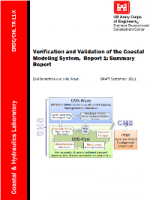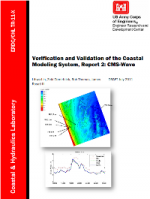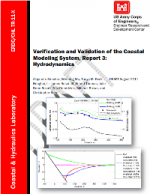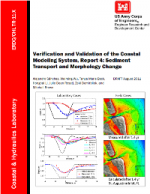Publications:Newsletters/Sep2011: Difference between revisions
| Line 11: | Line 11: | ||
The CIRP has completed four technical reports on the verification and validation (V&V) of the Coastal Modeling System (CMS). The V&V was performed for three main components of the CMS: Waves (Report 2), Hydrodynamics (Report 3) and Sediment Transport and Morphology Change (Report 4). Report 1 summarizes the framework and provides key findings of the V&V effort. The reports represent the first of a series and will be augmented in the future with additional V&V as data become available. The numerical methods were verified using analytical solutions of idealized cases. Calibration and validation were carried out using a wide variety of laboratory and field cases related to coastal problems at coastal inlets, adjacent beaches, navigation channels, navigation structures, and bays. Draft copies of the reports are available on the CIRP website: http://cirp.usace.army.mil/pubs/techreports.html. | The CIRP has completed four technical reports on the verification and validation (V&V) of the Coastal Modeling System (CMS). The V&V was performed for three main components of the CMS: Waves (Report 2), Hydrodynamics (Report 3) and Sediment Transport and Morphology Change (Report 4). Report 1 summarizes the framework and provides key findings of the V&V effort. The reports represent the first of a series and will be augmented in the future with additional V&V as data become available. The numerical methods were verified using analytical solutions of idealized cases. Calibration and validation were carried out using a wide variety of laboratory and field cases related to coastal problems at coastal inlets, adjacent beaches, navigation channels, navigation structures, and bays. Draft copies of the reports are available on the CIRP website: http://cirp.usace.army.mil/pubs/techreports.html. | ||
<gallery heights=" | <gallery heights="200px" widths="150px"> | ||
File:CHL-TR-11-Report1-l.png|[http://cirp.usace.army.mil/Downloads/PDF/CHL-TR-11-Report1.pdf Executive Summary] | File:CHL-TR-11-Report1-l.png|[http://cirp.usace.army.mil/Downloads/PDF/CHL-TR-11-Report1.pdf Executive Summary] | ||
File:CHL-TR-11-Report2-l.png|[http://cirp.usace.army.mil/Downloads/PDF/CHL-TR-11-Report2.pdf CMS-Wave] | File:CHL-TR-11-Report2-l.png|[http://cirp.usace.army.mil/Downloads/PDF/CHL-TR-11-Report2.pdf CMS-Wave] | ||
Revision as of 14:05, 29 September 2011
In this Newsletter:
Advances in Regional Sediment Management with CIRP Products
In 2009, the Jacksonville District (SAJ) initiated a Regional Sediment Management project at St. Johns County, Florida, for the purpose of analyzing regional sediment processes and management of these resources historically and in the future. SAJ has completed a sediment budget of the region, which is to be published in a Technical Report (Tech Report I, of a series of three). To accomplish some of their goals several CIRP tools have been employed over the last two years to help understand and improve management of the nearshore, beaches, and the primary inlet, St. Augustine Inlet. An inlet study was conducted in 2010 using the Coastal Modeling System (CMS) to define the impact of ebb shoal mining as a source for regular use in beach nourishment projects. SAJ and the CIRP collaborated on the study, and Tech Report II will be published on the findings in Winter. Recently, in 2011, SAJ, CIRP, and the Regional Sediment Management (RSM) Program have begun a study to use GenCade (a 1-D regional shoreline change model with representation of inlets) as a simplified process-based model with the purpose of optimizing different sediment management practices such as dredging and nourishment volumes and placement intervals. The results of this study will be published in Winter in a Technical Report (III).
POCs, Tanya Beck (CHL), tanya.m.beck@usace.army.mil and Kelly Legault (SAJ), kelly.legault@usace.army.mil
Technical Reports: Verification and Validation of the Coastal Modeling System
The CIRP has completed four technical reports on the verification and validation (V&V) of the Coastal Modeling System (CMS). The V&V was performed for three main components of the CMS: Waves (Report 2), Hydrodynamics (Report 3) and Sediment Transport and Morphology Change (Report 4). Report 1 summarizes the framework and provides key findings of the V&V effort. The reports represent the first of a series and will be augmented in the future with additional V&V as data become available. The numerical methods were verified using analytical solutions of idealized cases. Calibration and validation were carried out using a wide variety of laboratory and field cases related to coastal problems at coastal inlets, adjacent beaches, navigation channels, navigation structures, and bays. Draft copies of the reports are available on the CIRP website: http://cirp.usace.army.mil/pubs/techreports.html.
POC: Alex Sanchez, alejandro.sanchez@usace.army.mil.
Who is accessing the CIRP website?
CIRP recently started collecting website statistics to help identify strengths and possible weaknesses in the site. So far, in September 2011, there have been 382 visitors to the website with 1130 page views. Most visitors reside in the United States, although there have been many visitors from other countries including Canada, Italy, Australia, Turkey, and Great Britain. The largest referrer to the CIRP webpage was the CHL Website (http://chl.erdc.usace.army.mil), followed by Google, Bing and the CIRP Facebook page. Excluding the main page, the most popular pages are for CIRP Products and Publications.
POC: Mitch Brown, mitchell.e.brown@usace.army.mil.
Integrating the Channel Portfolio Tool (CPT) into District Practice
On Sept. 9th, 2011, Dr. Ned Mitchell demonstrated the Channel Portfolio Tool (CPT) to Operations managers at the Philadelphia District (NAP). CPT is a web-based decision-support software package (available to Corps personnel at: https://cpt.usace.army.mil) designed to give Corps personnel ready access to historical data concerning the depth-utilization by industry of commercial navigation projects. CPT uses the dock-level, Corps-use-only database from the Waterborne Commerce Statistics Center (WCSC) along with District-provided information concerning channel controlling depths for navigation. The visit to NAP and previous demonstrations for the Galveston District and South Atlantic Division were conducted as part of a broader effort (joint with the Regional Sediment Management program) to integrate CPT into the Corps' annual Operations and Maintenance (O&M) budget development cycle. At present, proposed O&M work items are evaluated and prioritized at the District, MSC, and USACE-HQ levels prior to final budget development. The data presented by CPT can assist with both work package formulation and also with prioritization of final submittals at all levels of Corps management. In addition to site visits at District offices, the CIRP is conducting online webinars for Districts interested in learning more about the CPT and its application to O&M budget development. If you are interested in a webinar demonstrating CPT, please contact Ned directly at 601-634-2022 or via email.
POC: Ned Mitchell, kenneth.n.mitchell@usace.army.mil.
The Coastal Modeling System Attains “CoP-Preferred” Status for HH&C CoP
The Hydraulics, Hydrology, and Coastal Community of Practice (HH&C CoP) for the Coastal Engineering and Coastal Navigation Areas of Expertise has recommended that the Coastal Modeling System (CMS-Wave and CMS-Flow) be added to the list of “Coastal” and “Coastal Navigation” Scientific and Engineering Technology (SET) Approved models. Lynn Bocamazo (NAN) as the HH&C CoP Area of Expertise Point of Contact for Coastal Engineering was the lead on the evaluation and reviewed the V&V reports (discussed above) and the “Enterprise Standard Software Validation for the HH&C CoP” white paper discussing the certification process to make the recommendation to the CoP. There are 5 categories for software: Enterprise Tools (software is mandated or required – very few pieces of software met this criteria), CoP Preferred, Allowed for Use, Retired (meaning they can still be used but they are no longer actively maintained and something more current is probably available), and Not Allowed for Use. Both CMS-Flow and CMS-Wave were recommended as CoP-Preferred for the “Coastal Navigation” and “Coastal” SET Approved models.
- The HH&C CoP approved software can be found at the following site: https://kme.usace.army.mil/NTCT/HHC/default.aspx.
- Once you get to this site, go to Documents/Shared Documents and then select SET Software Lists.
POC: Julie Rosati, julie.d.rosati@usace.army.mil , Zeki Demirbilek, zeki.demirbilek@usace.army.mil.
First Announcement: 13th Annual (38th Sequential) CIRP Workshop to be held March 2012
Please add to your 2012 calendar the 13th Annual (38th Sequential) CIRP Technology Transfer Workshop in March. This workshop will be sponsored by NAN, NAB, and NAP Districts and will be held at NAP. Advances in CIRP products and tools such as the CMS, GenCade, CPT, CSMART, RMAP, and others (see http://cirp.usace.army.mil/products/ for a complete listing) will be featured through teaching and hands-on sessions. Please contact Mitch Brown, Mitchell.E.Brown@usace.army.mil if you would like to be included on a list of potential attendees. More information on this workshop will be posted in the near future at http://cirp.usace.army.mil/workshops/nap12/NAP-Workshop.html
POCs: Mitch Brown, mitchell.e.brown@usace.army.mil , and Monica Chasten (NAP) monica.chasten@usace.army.mil.
Engineer Research & Development Center
3909 Halls Ferry Road, Coastal & Hydraulics Laboratory
Vicksburg, MS 39180
251-635-9519



